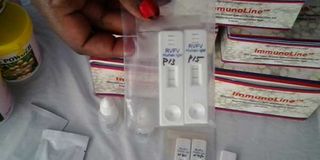Feeling sick? You could self-test for diseases at home

The kit developed by Kenya Medical Research Institute for testing Rift Valley Fever. PHOTO | FILE | NATION MEDIA GROUP
What you need to know:
- Self-care interventions are a complementary approach to healthcare that forms an important part of the health system.
- In Kenya, applications like MyDawa, an online pharmacy, are actively engaged in the business of selling medicines to customers.
- By 2035, WHO estimates that there will be an estimated shortage of nearly 13 million healthcare workers worldwide.
We could soon be regularly testing ourselves for several diseases and carrying out other procedures to safeguard our health, according to newly released World Health Organisation (WHO) guidelines.
This is contained in the WHO’s first guideline on self-care interventions which was launched on June 26, 2019
It is the WHO's first comprehensive volume on sexual and reproductive health and rights.
SELF-CARE
WHO defines self-care as “the ability of individuals, families and communities to promote health, prevent disease, maintain health and cope with illness and disability with or without the support of a healthcare provider.”
Self-care interventions are a complementary approach to healthcare that forms an important part of the health system.
“Self care is also a means for people who are negatively affected by gender, political, cultural and power dynamics including those who are forcibly displaced, to have access to sexual and reproductive health services,” adds the WHO news release on the launch.
The guidelines which were released during the WHO’s “self-care month”, arrive at a time when new diagnostics, devices, drugs and digital innovations are transforming how people interact with the health sector.
SELLING MEDICINES
In Kenya for instance, applications like MyDawa, an online pharmacy, are actively engaged in the business of selling medicines to customers. By December 2017, its subscribers had hit the 30,000 mark.
Some of the interventions listed in the guideline include self-sampling for HPV and sexually transmitted infections, self-injectable contraceptives, home-based ovulation predictor kits, HIV self-testing and self-management of medical abortion.
According to the UN body’s statistics, at least 400 million people worldwide lack access “to the most essential health services.”
By 2035, WHO estimates that there will be an estimated shortage of nearly 13 million healthcare workers worldwide.
WHO Director-General Tedros Adhanom said self-care could play an important role in dealing with emergencies and ensuring better health for individuals.
“It can be a vital way for people to take charge of their health, promote better health service provision, keep the people safe and serve them better,” said the WHO boss.




